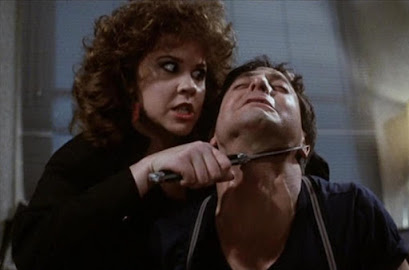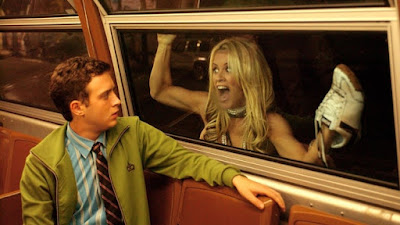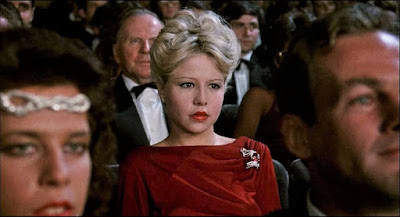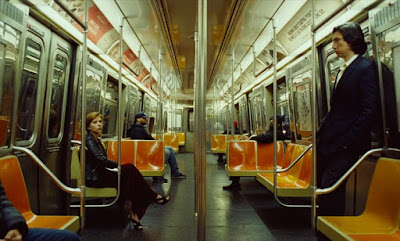Any discussion we can have about “Host” ought to begin with the genius of its timing. Made on the cheap, conceptualized in isolation and filmed entirely on web cameras during the recent Covid-19 quarantine, director Rob Savage took an idea previously used in the “Unfriended” series and spun it on its head, using it to an advantage that reflected this strange and frightening time of social distancing. All its stars, situations and setups are executed in a way that involves no one ever being in the same room with one another, although their cellphones and computers are all functional when they are haunted by a malevolent spirit moving between them. How does it come to be, and how do the six key players of the movie summon it on an evening when their remote gathering progresses into a gradual, unrelenting nightmare? That is part of the fun in this well-made little “found footage” picture that shows remarkable skill and modulation given the urgency at which it was formulated and released. Now available as an exclusive on the Shudder streaming service, Savage has breathed refreshing new life into a sub-genre that has long been floundering for new inspirations.
Monday, August 3, 2020
Friday, July 31, 2020
Savage Streets / *** (1984)
Good comedies are a dime a dozen. Mediocre ones ride a crowded wave occupied by the most consistent of underachievers: the same school of filmmakers that persist in the tired trend of momentary gross-outs, sight gags and juvenile humor associated with the human digestive system. Unintentional ones, on the other hand, are another commodity – they come from that place of mistaken values that is sometimes so vacuous of common sense, we are left with no other solution than to howl in protest. Consider “Savage Streets” as an example of this latter classification, and you begin to see beyond what can otherwise be surmised as a god-awful “Death Wish” rip-off. Not a single scene of the movie is modulated as if it were in sincerity. Characters speak to each other in vulgar soundbites that are detached from rhythms of the moment, seeming as if they are merely hurling graphic vulgarities at dead space for effect. And then there is a notable sequence in which two teenage competitors – one played by Linda Blair – engage in fisticuffs in the middle of the girl’s locker room while their naked classmates bounce up and down in enthusiasm. In any ordinary movie, these would be prime examples of sheer tonal absence. But then you take them into the context of a full running time that is chock-full of after-school-special melodrama, hammy acting, hackneyed back stories, implausible scenarios, overzealous cruelty, laughable sentiment and trashy and implausible violence, and you begin to suspect those involved have set out to make the most hilariously bad movie of its time.
Monday, June 29, 2020
Eaten Alive / *** (1976)
Much of what occurs on-screen in “Eaten Alive” is rooted in the sort of exploitative chutzpah of 70s horror films that frequently inspired those first audiences to recoil in utter disgust. Already familiar with those dubious qualities from his “The Texas Chainsaw Massacre,” of course, director Tobe Hooper committed to a similar premise that might as well have been transcribed from the diary of those original maniacs: a motel manager with crippling nervous ticks routinely invites strangers into his run-down establishment, terrorizes them and then murders them in cold blood before throwing their bodies – sometimes while still breathing – over the edge of his porch for a nearby crocodile to feast on. Occasionally, those victims will include relatives of prior victims, who go in search of their lost loved ones by retracing their steps right back to the spot of their demise. Yet somehow they resist all initial urges to question the shady nature of the establishment: stained wallpaper, rickety stairs and unstable floor boards all seem to suggest that a place like this would have been long condemned by the health board, much less been allowed to run a continuous operation. How do they allow themselves to dismiss skepticism long enough to accept lodgings? Why do they feel comfortable leaving behind their own belongings while they venture back into the city searching for clues? These are the impulses of men and women who have never even heard of a horror film, much less ever been in a situation where they are asked to exchange platitudes with eccentric recluses who smell of violence and shame.
Sunday, May 31, 2020
The Wraith / **1/2 (1986)
In the annals of absurd action films that dominated the public’s awareness during the 80s, “The Wraith” may hold special distinction as the silliest of them all. How else would one describe the very idea of this film? Could it be done with a straight face, or some semblance of seriousness? Here is a premise that seems as if it were pulled right out of farce: a gang of car thieves murder a man, and then said victim is reincarnated from above so that he can exact his revenge by, well, racing them all to their deaths inside a mysterious black car. But wait, it gets better: when he is not inside said vehicle, he appears as an enigmatic drifter played by Charlie Sheen, who comes into town and interacts will all the same people who were once part of his previous life, including those who killed him. How do they not recognize him? Because, rather conveniently, his face has been changed. Furthermore, none of those observers suspect who he really is, although chance encounters eventually create enough of a sense of déjà vu to inspire all the obligatory inquiries (“have we met before?”). If you’re still paying attention, congratulate yourself: you may have actually thought more thoroughly about this setup than Mike Marvin, whose screenplay might as well have been assembled out of remnants of shorthand notes from an etch-a-sketch.
Wednesday, May 27, 2020
Unfriended: Dark Web / ***1/2 (2018)
No single idea in the found footage horror subgenre has been as inconclusive as that of the one first observed in “Unfriended.” Consider the concept: for 83 minutes, characters remain static in a world of pixelated webcam images and cluttered desktop screens while a malevolent force somewhere in their chat boxes taunts them. Gradually, they are ambushed by something outside the periphery of the Skype window, until a lone person is left to answer for crimes that all present may have once participated in. Is this an idea full of potential, or one where the gimmick is destined to fade from novelty after the initial experience has worn off? Our fascination was certainly enough to inspire a single sit-through of the first attempt, although that movie sees little in the way of ongoing value; once the ploy is understood, the antics play like a wind-up toy instead of a plausible tool to modulate tension, especially in repeat viewings. Yet here we are again for a sequel, titled “Dark Web,” which utilizes the exact same format and implores the spontaneous hysteria of the same sorts of young actors, who balance their running commentary with all the perfunctory inquiries – like, “what’s that noise?” or “please don’t hurt me!” The irony of most new approaches in horror is how thoroughly familiar all the tricks seem, even as they are repackaged to avoid more obvious giveaways.
Tuesday, April 21, 2020
The Miranda Murders: Lost Tapes of Leonard Lake and Charles Ng / * (2017)
A movie like this is almost unbearable without a coherent running dialogue. “The Miranda Murders” belongs primarily to that ever-so-volatile subgenre of found footage horror films, but must be prefaced with an even graver emphasis: all the footage functions as a reenactment of an actual killing spree that took place in California during the mid-80s. For those well-versed in serial killer psychology, the names will be familiar: Leonard Lake and Charles Ng were like blood brothers destined for infamy, linked by the nihilistic world view that innocent young women were meant to be abducted and then molded into submissive sex slaves for their own perverse pleasures, often in front of a camcorder. When they acted out or misbehaved, the punishment would be severe – sometimes violent, sometimes intimidating, always ending in their untimely demises. Now comes this strange concoction of a film that attempts to fill a great void: namely, what exactly transpired in those turbulent months between 1983 and 85 when they lured victims to their compound, filmed them in fearful protest and then disposed of their remains throughout the property? Though some of the actual footage of their exploits survives, the gaps were apparently intriguing enough to inspire Matthew Rosvally to interpret the unknown on old-fashioned analogue tape. The result is one of the most poorly realized ideas of recent memory.
Tuesday, April 14, 2020
Hatchet / *** (2006)
A convoluted legend is never far from the fabric of an original horror film, and Adam Green’s deliriously violent “Hatchet” discovers one of the more interesting of recent memory. Somewhere in the haunted bayous of New Orleans exists the image of a monstrous force, a disfigured man who died long ago in a terrible accident and returns, each night, to stalk the woods in search of his lost father. Unfortunate bystanders who wander nearby are destined to become victims of his murderous rampage, but so rare has their obligatory fate been this ambitiously macabre: in the course of just 85 minutes, the villain is seen prying a skull off someone by the upper jaw, cutting through a man’s spinal column with a machete, beheading countless screaming teenagers and even dismembering one with a belt sander. In the murky depths of Crystal Lake, Jason Vorhees must be sick with envy. But is the terror of one Victor Crowley a cause of some deeply established voodoo curse, or did the poor boy really survive his ordeal in order to carry out his angry mission? That riddle is at the center of an otherwise superfluous mystery, in a movie that has the distinction of being relentlessly delightful while it is inspiring our pained winces.
Sunday, April 12, 2020
Cats / 1/2* (2019)
Think of a large wad of cash being doused in gasoline, immediately followed by a lit match tossed into the pile. Picture, with some forlorn amazement, a machine that rapidly prints dollar bills as they are guided on a conveyor belt that empties into the mouth of a giant shredder. Fathom the idea that someone, somewhere, could make “Cats” with a straight face, and you get an impression of how deep these thoughts must run as they regard their own endeavor with some level of regret. So much money went into this ambitiously misfired movie that every scene must play like a eulogy for all their future endeavors. If it is true, as reports suggest, that the film adaptation of the famous Broadway musical by Andrew Lloyd Weber was financed to be made with over $100 million in assets, it is worth lamenting the high cost of modern Hollywood trash. Yet those unlucky enough to find themselves at a screening of said result will most likely be concerned with more direct notions: namely, how such an expensive commodity like this could be released in such an unfinished state, much less be considered salvageable in the first place. Take away all of that, and what remains is a who’s-who of actors who look as if they might be occupied by thoughts of exile from the medium.
Thursday, March 26, 2020
Pompeii / **1/2 (2014)
Had I still been a naïve teenager obsessed with the mythos of ancient volcanic disasters, a movie like “Pompeii” would have provided one hell of a visual wet dream. Here is an ambitious production mounted in the tradition of old Hollywood epics, stretched beyond the scale of a mere screen, and hitched to that dependable staple of disaster films that seek to show us an array of grandiose visions that are both terrible and awe-inspiring. Unfortunately, time and experience often separates us from simpler pleasures, relegating our measurements of entertainment to comparisons of other, more sophisticated endeavors. A read-through of the premise immediately conjures up all those conventional comparisons: among other things, the story contains a main character obsessed with revenge while fighting for his own life in public arenas (“Gladiator”), ancient roman political intrigue (“Troy”) and a blossoming romance between young faces that are separated by class divides (“Titanic”), all set in the foreground of a catastrophe looming in the distance (any number of well-known blockbusters of the past thirty years). Take away all those call-backs, and what you are left with is basically a competent action picture that retreads to the safety of its formulas, primarily because it doesn’t have the desire, much less the thought, to pursue more challenging avenues.
Tuesday, March 17, 2020
Dirty Love / zero stars (2005)
During a schmaltzy greeting card monologue in the opening scenes of “Dirty Love,” the heroine informs us that “love is unreal,” before launching into a scene of hysteria after she has discovered the love of her life in bed with another woman. Most people scarred by that sort of discovery, at least in a comedy, would usually plot some sort of devious revenge. Rebecca (Jenny McCarthy) opts to make her grief an incompetent public spectacle, which will include her approaching sex workers for job applications, showing up to public gatherings on the arms of awkward losers, and avoiding run-ins with her ex in various locales, like a grocery store while she is tripping over her own menstrual blood. Are you still listening to this? These are the sight gags of a filmmaker who has watched a plethora of outrageous comedies but has only memorized out-of-context punchlines, relegating everything that he does to a one-note show of languid showmanship. Even then, most narrow concepts could be forgiven if they produce laughs, however shallow. John Asher’s junkyard of a film, unfortunately, only inspires the sorts of groans usually reserved for painful indigestion.
Wednesday, February 19, 2020
The Lonely Lady / 1/2* (1983)
Forget, for a moment, all the dreadful things you have heard about “The Lonely Lady.” Dismiss the conventional criticisms that peg it as one of the more pronounced turkeys of its time, ranging from the shoddy acting to the implausible premise. Absolve yourself of any knowledge of Pia Zadora’s strange rise to fame, or how her entire participation in this mess came to be. Resist the urge to read through some of the cringe-inducing dialogue, avoid the temptation to blame shoddy makeup or inept scene staging, and ignore all attempts at understanding the long and notorious back-story. Those notions will only color your view. Oh, an exhaustive list of problems could be assembled about the movie in question, and few of them would be arguable, but those traits in themselves do not quantify all the reasons this film endures so vividly. Something more precise, more glaring, had to be wrong with what was on screen. After lumbering through a recent viewing, I believe I finally deciphered the key distinction: that this may be the most shamelessly evasive drama ever written.
Tuesday, January 28, 2020
Summer of 84 / *** (2018)
Any teenage boy who owns a pair of binoculars is destined to see himself as a private investigator. He uses them like an infallible window into the unknown, a dagger that pierces a hole through comfortable exteriors to study the inner workings of people with seedy private lives. Hitchcock used this ideology to fuel the voyeuristic tendencies of his hero in “Rear Window,” and now young Davey Armstrong adopts it while he spies shamelessly on his neighbors during the warm nights in “Summer of 84.” His first glimpse is innocent: harboring a crush on the girl next door, the lenses provide him a bird’s eye view of her upstairs bedroom, usually while she is in various stages of undress. Later, after news breaks that the disappearance of a dozen young boys in the county is linked to a single culprit, they become the instrument that will guide his quest against the cop across the street, whom he suspects may be the serial killer in question. The key difference, perhaps, is that voyeurs are content to watch without involvement., whereas Davey turns his endeavor into a quest that includes stalking the outer perimeter of a man’s house, going through the trashcans and even digging up a backyard in search of corpses.
Tuesday, January 14, 2020
Marriage Story / ** (2019)
Aficionados of Noah Baumbach’s eccentric brand of hard-hitting family comedies will find themselves right at home in “Marriage Story,” the latest in his resume of accessible mainstream opuses. The rest of us would argue it could have used three key additives: a better script, more focus on the pain, and less insufferable leads. That is not to discredit or undermine the abilities of Adam Driver and Scarlett Johansson, who are competent in the material, but to emphasize the corner they are painted into. Here are two likable actors swimming upstream in a current that wants to drown them in detestable melodrama, and for nearly every scene they occupy shared space, we find ourselves praying for psychological intervention. They are cloying, arrogant, and deluded. Towards the middle act, well before the two come to a head in a heated exchange about unresolved feelings, they are offered advice from brutally honest lawyers as to what steps to take in maintaining custody of their young son. The more proactive argument ought to have been obvious: why do either of them deserve to supervise a goldfish, much less an impressionable kid?
Subscribe to:
Posts (Atom)













